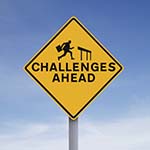 In October, we asked what you anticipated to be your company’s biggest roadblocks to finishing strong in 2014. According to the results, with 19% of the votes, “outside influences (i.e. regulations, competition, economy, etc.)” is weighing heaviest on the minds of business leaders as we head into the end of the year. In second place, 16% of respondents said “lack of skilled workers” would be their biggest roadblock, followed by “insufficient staff” at 14%.
In October, we asked what you anticipated to be your company’s biggest roadblocks to finishing strong in 2014. According to the results, with 19% of the votes, “outside influences (i.e. regulations, competition, economy, etc.)” is weighing heaviest on the minds of business leaders as we head into the end of the year. In second place, 16% of respondents said “lack of skilled workers” would be their biggest roadblock, followed by “insufficient staff” at 14%.
The rest of the results are as follows:
- Poor leadership (13%)
- Turnover and retention issues (11%)
- Disengaged workforce (11%)
- Unclear goals (8%)
Another 8% of respondents chose the “other” option and submitted their own roadblocks that they anticipate being an issue for their companies, including:
- Weather/cold and snow conditions
- Soft sales numbers
- Cash flow shortages
- Endemic favoritism
- Supplier quality issues
The Skills Gap is Taking a Toll
Of the top three responses to the poll, two are directly related to the growing skills gap—lack of skilled workers and insufficient staff. In fact, according to a recent CareerBuilder study on the skills gap:
- 81% of employers say it’s at least somewhat difficult to fill job vacancies
- Some of the top causes cited as contributing to the skills gap include:
- Education gaps in particular areas (55%)
- Gaps in on-the-job training (53%)
- New/shifting technologies (48%)
- Outsourcing of job to other countries (48%)
- Gaps in expectations about wages (47%)
- Lack of knowledge about potential career opportunities
- 61% of employers have hired a person who does not meet the requirements of the job
You can download the full CareerBuilder report here.
So, What Do We Do?
While it’s a question with many different answers, one that most business leaders can agree on is there needs to be a greater emphasis on education and training programs that better prepare people for the kind of jobs that are available.
According to the CareerBuilder study:
“Academia must also aid in the effort to close the skills gap. Academics need to create pathways of communication with employers who are likely to hire their graduates. These relationships can be valuable sources of information concerning specific skills employers need, and academics can use this information to integrate changes to their program requirements with the intention of graduating truly marketable candidates.”
More detailed insight into the benefits – and increasing need – of education programs to address the skills gap, are highlighted in the Express Employment Professionals white paper, “Caution: College May Not Be for Everyone,” which explores the effects of the skills gap and the promise of Career Technical Education programs.
Have you experienced a skills gap in your workforce? What are some ways you’ve addressed your need for skilled workers? What trends do you see for the future if something isn’t done to close the skills gap soon? Let us know in the comments section below.

No comments yet.